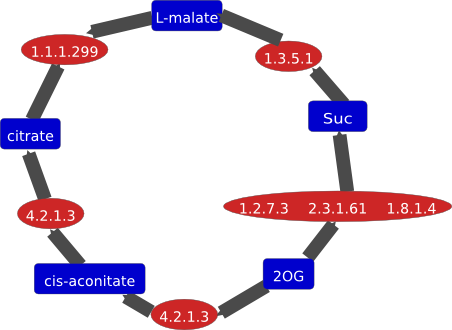EC Number   |
Posttranslational Modification   |
Reference   |
|---|
    2.8.4.1 2.8.4.1 | alkylation |
enzyme MCR contains methylhistidine (His271) and methylcysteine (Cys472), as well as 5-C-(S)-methylarginine. A unique radical SAM methyltransferase is required for the sp3-C-methylation of the arginine residue of methyl-coenzyme M reductase, the a 5-C-(S)-methylarginine is located close to the active site of the enzyme. Deletion of the methyltransferase gene ma4551 in Methanosarcina acetivorans strain WWM1 leads to the production of an active MCR lacking the C-5-methylation of the respective arginine residue. The methylated arginine is important for MCR stability under stress conditions Identification of potential radical SAM methyltransferase genes in the genomes of methanogens, overview |
-, 762454 |
    2.8.4.1 2.8.4.1 | alkylation |
S-methylation of Cys472 in McrA by a SAM-dependent methyltransferase MA4545 or McmA belonging to the InterPro superfamily (UniProt ID Q8THH2). The DELTAmcmA mutant is viable on all growth substrates tested, relative to wild-type, the mutant grows 30% slower on DMS, and a 12% decrease in growth yield is observed on trimethylamine. Even though the S-methylation of Cys472 in McrA is dispensable in Methanosarcina acetivorans, it is clearly important for methanogenic growth on certain substrates. Conversion of Arg285 in McrA to 5-(S)-methylarginine depends on enzyme MamA. The L461-R491 peptide contains the Gly465 and Cys472 that are modified to thioglycine and S-methylcysteine by ycaO-tfuA and mcmA, respectively, as well as the didehydroaspartate at Asp470 |
-, 762194 |
    2.8.4.1 2.8.4.1 | alkylation |
the posttranslational methylation of arginine in methyl coenzyme M reductase has a profound impact on both methanogenesis and growth of Methanococcus maripaludis. Protein Mmp10 is necessary for arginine methylation. Replacement of the only conserved His residue in the C-terminal half of Mmp10 with either G or F results in a loss of less than 1% of Arg275 methylation |
-, 761400 |
    2.8.4.1 2.8.4.1 | more |
four amino acid modifications are reported to be present in McrA, namely methylhistidine (His271), methylcysteine (Cys472), thioglycine (Gly465) and didehydroaspartate (Asp470). Mass spectrometric analysis |
-, 762454 |
    2.8.4.1 2.8.4.1 | more |
functional interactions between posttranslationally modified amino acids of methyl-coenzyme M reductase, overview. Modified McrA residues are independently installed |
-, 762194 |
    2.8.4.1 2.8.4.1 | more |
hylogenetic analyses of methyltransferases TfuA and YcaO in methanogenic andmethanotrophic archaea |
-, 756576 |
    2.8.4.1 2.8.4.1 | more |
the McrA subunit possesses up to five highly conserved but not universal posttranslational modifications (PTMs) at its active site, including 1-N-methyl-His261, 5-C-(S)-methyl-Arg275, 2-(S)-methyl-Gln403, and thio-Gly448, which are all found within the McrA subunit |
-, 761400 |
    2.8.4.1 2.8.4.1 | side-chain modification |
formation of thioglycine (Gly465), growth defects are associated with loss of the McrA thioglycine modification, mutations in ycaO and/or tfuA are responsible for loss of the thioglycine modification. Thioglycine does not influence the global stability of MCR |
-, 756576 |
    2.8.4.1 2.8.4.1 | side-chain modification |
methylation of residues in the active site, e.g. at His257, 5fold methylation in isozyme MCR I, overview |
673602 |
    2.8.4.1 2.8.4.1 | side-chain modification |
methylation of residues in the active site, e.g. at His257, overview |
673602 |





